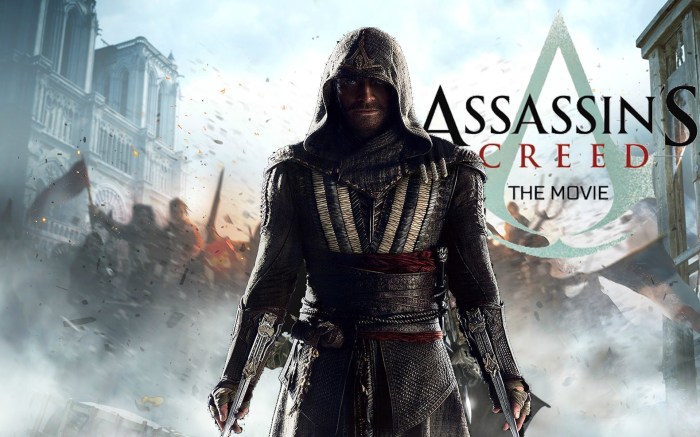Assassins creed movie will be a milestone for adaptations – Assassin’s Creed movie will be a milestone for adaptations. Forget the usual video game movie curse – this could actually be *good*. We’re talking epic historical settings, parkour-fueled action sequences, and a sprawling narrative ripe for cinematic brilliance. Could this finally be the game adaptation that breaks the mold? Let’s dive into why the Assassin’s Creed movie has the potential to redefine what’s possible when bringing beloved games to the big screen.
The challenge lies in translating the intricate gameplay mechanics – the stealth, the parkour, the hidden blade assassinations – into a cohesive and thrilling cinematic experience. But with the right vision and execution, the rich lore and compelling characters of the Assassin’s Creed universe could easily captivate a massive audience, both gamers and newcomers alike. The potential is enormous, and the stakes are high.
Marketing and Audience Expectations: Assassins Creed Movie Will Be A Milestone For Adaptations
Adapting a beloved video game franchise like Assassin’s Creed to the big screen is a high-stakes gamble. Success hinges not only on a compelling narrative and impressive visuals but also on a shrewd marketing strategy that bridges the gap between passionate gamers and a broader cinematic audience. Failing to manage expectations from both camps can lead to a critical and commercial flop, even with a seemingly perfect product.
The Assassin’s Creed movie faced this challenge head-on. Understanding and addressing the distinct expectations of gamers and casual moviegoers was crucial for its marketing campaign. The key was to find common ground – the thrilling action, historical settings, and compelling characters – while simultaneously appealing to the unique sensibilities of each group.
Marketing Strategies for Diverse Audiences
A multi-pronged marketing approach was necessary. For existing fans, leveraging the established lore and characters was paramount. Teaser trailers focusing on familiar elements like the Animus technology, iconic weapons, and glimpses of historical settings would have resonated deeply. Exclusive content released to gaming communities, behind-the-scenes footage showcasing the attention to detail in recreating historical periods, and early access screenings for dedicated players could have built anticipation and loyalty. Conversely, for new audiences, the marketing needed to focus on the core narrative elements: a thrilling adventure, a compelling protagonist, and visually stunning action sequences. This could have involved a more general marketing campaign that emphasized the movie’s plot and the appeal of its star-studded cast, rather than diving too deeply into the intricacies of the game’s lore. Think of the marketing campaign for “Gladiator” – a compelling story with stunning visuals, not an encyclopedic breakdown of Roman history.
Comparing Gamer and Moviegoer Expectations, Assassins creed movie will be a milestone for adaptations
Gamers, deeply invested in the Assassin’s Creed universe, would have had specific expectations. They might have anticipated a faithful adaptation of the gameplay mechanics, a nuanced portrayal of the Creed’s philosophy, and a high level of historical accuracy. A deviation from established lore or a simplification of the complex narrative could have easily led to disappointment. Moviegoers, on the other hand, might have been primarily drawn to the advertised action, adventure, and the allure of a big-budget spectacle. Their expectations might have been less specific to the game’s details and more focused on a generally entertaining and engaging cinematic experience. The potential for conflict arose from the risk of alienating gamers with a simplified or altered narrative, while failing to capture the attention of a wider audience with a story too complex or niche.
Managing Expectations and Avoiding Alienation
The key to success lay in finding a balance. Marketing materials should have acknowledged the game’s rich history and established fanbase while simultaneously presenting the film as a standalone story accessible to newcomers. Highlighting the core themes of freedom, rebellion, and the eternal struggle between Assassins and Templars – themes universally appealing – would have been a smart strategy. Furthermore, transparent communication about any creative liberties taken in adapting the source material could have managed expectations and fostered understanding. The film’s marketing could have emphasized the cinematic experience, showcasing the scale and scope of the production, while simultaneously offering dedicated content to appease hardcore fans. For example, behind-the-scenes featurettes explaining the choices made in adapting the story could have bridged the gap between the two audiences, demonstrating respect for the source material while highlighting the film’s unique cinematic qualities. Think of the way Marvel Studios managed expectations with their interconnected films: a blend of accessible storylines and fan-service elements.
Ultimately, the success of the Assassin’s Creed movie hinges on its ability to capture the spirit of the game while crafting a compelling narrative that stands on its own. If the filmmakers manage to successfully blend the action, intrigue, and historical depth of the source material with a strong cinematic vision, this adaptation could not only revitalize the franchise but also set a new standard for video game movie adaptations. Get ready, because this might just be the one that changes everything.
The upcoming Assassin’s Creed movie has the potential to be a game-changer for video game adaptations, finally breaking the curse of poorly received film translations. It’s a high-stakes gamble, much like the risk Uber takes when they publish a list of reasons to get riders banned, as seen here: uber publishes list get riders banned. Ultimately, success hinges on execution, but if it lands, this Assassin’s Creed film could redefine the landscape of gaming-to-screen adaptations.
 Insurfin Berita Teknologi Terbaru
Insurfin Berita Teknologi Terbaru
